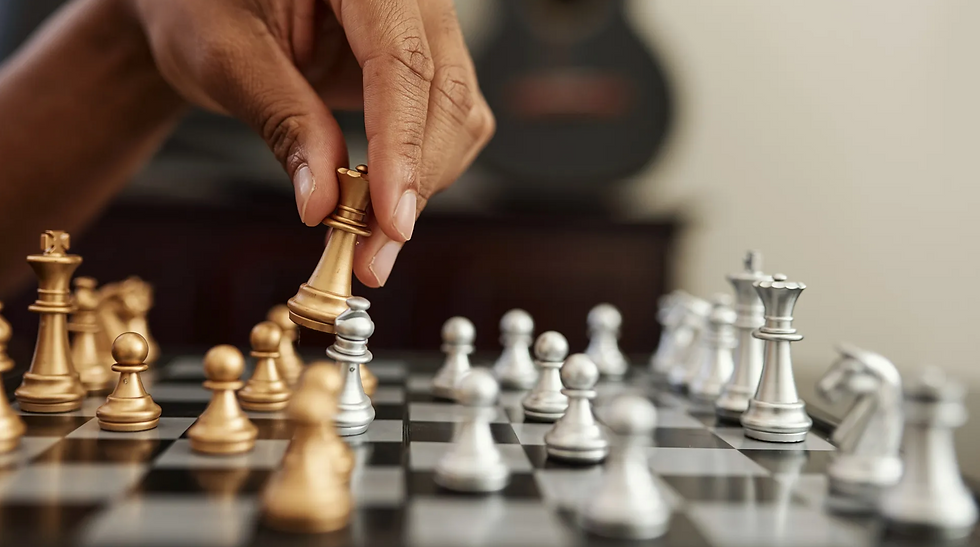
“The more we value things outside our control, the less control we have.” - Epictetus
I first stumbled upon chess when I was a restless 17-year-old indifferent to any sort of gaming. I had always been immune to the allure of flashy graphics and intricate storylines.
Surprisingly, unlike the vibrant graphics of trending video games, it was the simplicity of pawns on a chessboard that eventually hooked me. What began as a way to pass the time during dull, dragging classes soon became a hobby – one that I was terrible at.
I initially lost almost every game, utterly unfamiliar with basic chess terms like ‘castling’, and making blunders that would make any seasoned chess player cringe.
Fast forward 3 years today, my approach to the game of chess has eventually matured, much like my perspective on life.
Through accumulated hours of poring over chess puzzles in my leisure, I came to develop a new appreciation for the 1500 year old game. There are almost endless permutations of moves and strategies possible within the deceptively narrow constraints of the 8x8 square board, much like the myriad of ways one can navigate life’s constraints. In the face of chess’s complexities, I learnt to adopt a Stoic approach, which I also believe is applicable to life.
Stoicism
Stoicism is essentially a Hellenistic philosophy which pushes forth the notion that the wise live in harmony with logos (reason).
A disclaimer that this is not to be mistaken as a philosophy negating the natural human experience of emotion–the philosophy simply encourages us to focus on what is within our control and accept what we cannot.
Stoicism surged in popularity when Greek society was breaking down. Today, we see history repeat itself.
There’s been a resurgence of Stoicism in our volatile modern era with Stoic self-help book titles topping Amazon bestseller lists. This is demonstrative of how humanity turns to Stoicism when the world is chaotic, ambiguous, and ultimately anxiety-inducing. We humans are creatures of order and comfort and Stoic philosophy allows one to maintain an internal sense of order amidst external upheaval.
Just as Stoicism helps us manage life's uncertainties by focusing on what we can control, chess teaches us to approach each move with deliberate thought and acceptance of the inherent unpredictability of the game.
Chess demands players to remain fully engaged and composed to remain in a flow state, under the pressure of a ticking clock. Restlessness impairs decision-making, and chess requires calm focus.
This quality of chess would have resonated with Seneca, a founder of the Stoic school of thought who viewed restlessness as symptomatic of psychological slavery and a sign of a troubled mind.
Stoicism teaches that being present and fully engaged in the moment is a virtue, guiding individuals to navigate life with clarity and composure.
The Chessboard of Life
In chess, like in life, we often do not have full control of the final outcome.
The addictiveness of online chess lies in winning and seeing your ratings concurrently soar. However, to ‘game’ chess lies not in mindlessly spamming back to back games to increase one’s winning chances.
Chess is primarily a game of strategy, not luck: it requires a player to meticulously analyse their losing games and adjust their strategies accordingly as the most sustainable way to increase one’s chess level in the long run.
This nature of chess fosters resilience, as it shifts the focus from external validation—like ratings or accolades — to internal growth and understanding. Whether in victory or defeat, the Stoic approach in chess and in life encourages players to focus on what they can control which is their gameplay: to learn from experience and develop new strategies to adapt to extenuating circumstances.
Finally, just like how we cannot choose if we play as white or black in chess, we do not choose our starting points in life.
Chess taught me humility and acceptance in facing life's inequalities: while chess.com and lichess’s algorithms deliberately pair users with someone of their own calibre to ensure 50-50 win lose ratio, one may occasionally be paired with a higher-rated individual, risking suffering an unfair loss.
Stoicism extols the virtue of equanimity in defeat. The lesson here is to play the best game possible whether in life or chess, regardless of the starting position.
Concluding Thoughts
As we move through the treacherous waters of life, the Stoic approach reminds us to loosen our attachment to the end result.
From a Stoic perspective, chess parallels life in that we can only aim for the best possible outcome through consistent effort and sound decisions.
The essence of chess thus, I believe, transcends its nature as a 2 or 3 dimensional game (depending on whether you’re playing it on a mobile device or in real life).
If I could go back in time to meet my sheltered 17 year old self who was comfortably nestled as a student within a predictable system, blissfully unaware of how unpredictable life can get, I would tell her to navigate life like a chess game – doing your best and accepting the rest will suffice.

Comments